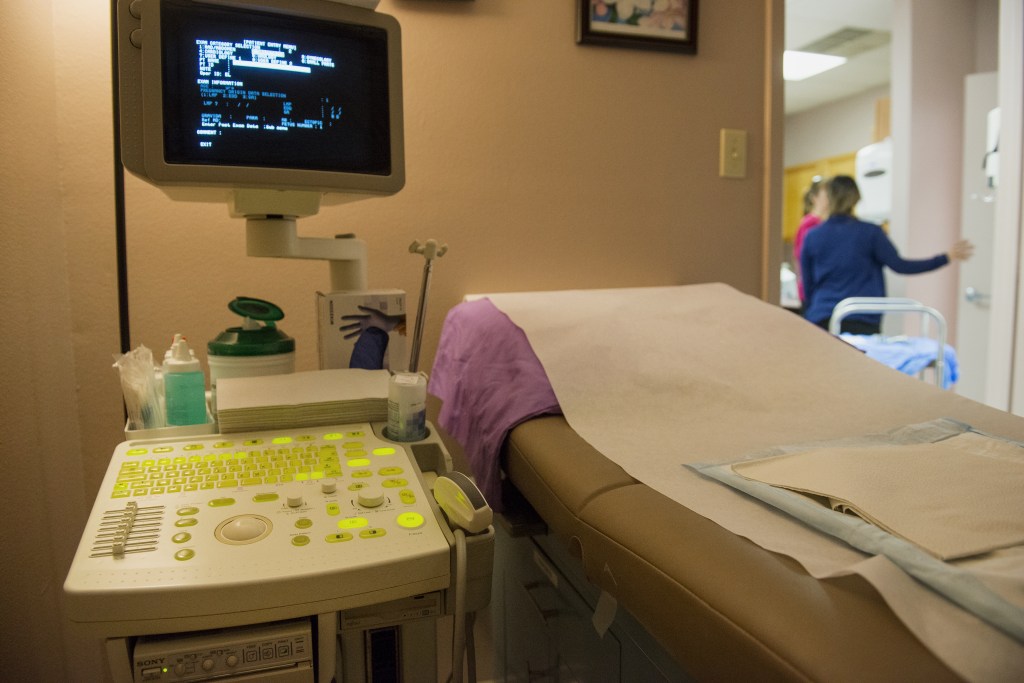When Rachel Scruggs, 25, found out she was pregnant in the fall of 2018, she knew immediately she would need an abortion. Just weeks prior, she had extricated herself from an emotionally abusive relationship, and she already had a 5-year-old son to look after. Scruggs, who works as a waitress in Manassas, Virginia, took the day off and found a ride to the nearest abortion provider in Falls Church.
At her appointment, Scruggs learned she was seven weeks along, meaning she could have a medication abortion using the drug Mifeprex. Although major medical groups agree that medication abortion can be safely prescribed by midlevel providers like nurse practitioners and physicians’ assistants and administered at home, Virginia law requires that a physician prescribe it and and FDA rules mandate that it be administered in the office.
Videos by VICE
The state also required Scruggs to sit through counseling advising her that the “father” of the “unborn child” is liable for child support, and that resources like adoption agencies are available. “The counseling questions were demeaning,” Scruggs said. “They were forced to treat me like I was incapable of making this decision.”
Her doctor was required to provide an ultrasound, despite the fact that routine ultrasound is not medically necessary for a first-trimester abortion. Then, she had to wait 24 hours before she could come back to the clinic to receive the drug.
“The only thing they did at the second appointment was give me the pill,” Scruggs said. “You don’t need all these regulations in place to hand someone a pill. I lost three days of wages, and had to arrange child care for all of them. I couldn’t get a ride for the second appointment, so I had to Uber there and back, 30 minutes each way.” The logistics alone cost her hundreds of dollars.
A saga like this—medically unnecessary, demeaning, expensive—is exactly what house bill 980 aims to fix. The bill, a version of which was passed by both the House and Senate, rolls back abortion regulations put into place over decades of anti-choice policymaking.
Gov. Ralph Northam is expected to sign the final bill. “HB980 is part of the Governor’s legislative agenda, meaning he supports the legislation and has been advocating on its behalf,” Alena Yarmosky, press secretary for Gov. Northam, said earlier this week. “These laws are about attacking women’s rights and interfering in Virginians’ personal medical decisions—it’s past time they were repealed.”
The new bill eliminates the ultrasound requirement and 24-hour waiting period, as well as extensive and unnecessary building code requirements for abortion clinics, which treated them like hospitals. It will also allow non-physician medical professionals to provide abortions. The House bill expanded the provider pool to nurse practitioners, certified nurse midwives and physician’s assistants. The senate version of the bill narrowed it to only nurse practitioners.
Majority Leader Del. Charniele Herring, the sponsor of the House version of the bill, said its goal is simple: “It shows the women of Virginia that legislators are now willing to get out of the doctors office, and that we trust them to make their own healthcare decisions.”
By limiting restrictions and expanding who can provide the procedure, the hope is access to the procedure will increase, especially for vulnerable populations, said Kate Sarna, press secretary for the Virginia House Democratic Caucus. “These restraints affect all women who are in need of reproductive health services but disproportionately hurt women of color, rural women, women receiving low incomes, and young women.”
At a time when abortion bans and restrictions continue to pass in neighboring states, and the newly conservative Supreme Court is about to hear arguments in a case that could overturn or seriously diminish Roe v. Wade, which could shutter abortion clinics in hostile states, Virginia will now be a sanctuary for abortion access.
You can’t overstate the importance of this bill, said Elizabeth Nash, a senior state issues manager at the Guttmacher Institute. “This will be a landscape change in Virginia.”
But even more than that, this bill will make Virginia a lifeline in the likely event that abortion becomes harder to access elsewhere, explained Tarina Keene, executive director of NARAL Pro-Choice Virginia.
“Here in Virginia we want to be a beacon of hope should the worst case scenario happen. We also need to be a safe haven, especially for the states that border us: West Virginia, Tennessee, Kentucky, those states that have already moved to ban abortion or are in the process of doing so. It’s not just about Virginia, it’s about those people who will not have that access.”
For example, though the state of Kentucky has a newly elected pro-choice Governor in Andy Beshear, the state legislature is extremely hostile to abortion rights and has been for years. Until last month, there was only one abortion clinic remaining. There are now two clinics, but they’re both in Louisville, along the Indiana border. There is also a 24-hour waiting period in Kentucky. With Virginia’s new bill, it may be easier for some people in Kentucky to instead travel west to access abortion services in Virginia—especially if there is no waiting period that would require staying overnight.
Virginia is not the only state to pass legislation to protect abortion recently: Last year, New York passed the Reproductive Health Act to codify Roe v. Wade into state law and allow professionals like nurse practitioners to provide abortions. Illinois, Rhode Island, and Vermont made similar moves in 2018 and 2019.
The widening gap between states with increasingly progressive abortion laws and those with increasingly draconian abortion laws, all against the back drop of a new, right-leaning Supreme Court feels newly dire but is not uncharted territory, Nash explained. In the years preceding the landmark 1992 Planned Parenthood v. Casey decision, legislators in multiple states moved to protect Roe out of fear that the end was near.
In Casey, the Supreme Court ultimately protected Roe. But it also undermined Roe‘s protections by allowing states to regulate the procedure, which lead to an avalanche of onerous state-level restrictions. In 2016, the Supreme Court narrowed that standard set by Casey in the Whole Women’s Health v. Hellerstedt decision so that states had to prove that any regulations on abortion did not impose an undue burden on people seeking abortion.
And now, in 2020 with a Supreme Court that is more conservative than ever, the court will further consider the question of how much the government can intervene in June Medical Services v. Russo. This is a case brought by the Center for Reproductive Rights that challenges a Louisiana law requiring doctors who provide abortions to have admitting privileges at a hospital. (Requiring admitting privileges, especially in areas hostile to abortion providers, is a way to make it impossible for providers to get licenses, advocates say.)
“The Louisiana case is sort of front and center right now. There’s a real threat, and legislators are responding to that,” Nash said of lawmakers in Virginia and elsewhere. At the federal level, pro-choice lawmakers are advocating for The Women’s Health Protection Act, which would make it much harder for states to pass medically unnecessary restrictions or bans that limit access to abortion.
How the Supreme Court will decide the Louisiana case is completely up in the air, of course. If the decision guts Roe completely, there would be nothing stopping hostile states from banning abortion outright. States like Virginia that have moved to protect abortion rights and access, however, will be in a good position to continue providing accessible services to their residents, and to people who may unfortunately have to travel.
In the end, what happened in the early 90s should offer lessons for today. “After Casey, both sides celebrated like they’d won,” Nash said. “The conservative side really refocused at the state level. Those that wanted to protect abortion said, well we have the court. But as we’re now seeing, states were so important, then and now. Providing protections needs to be at every level. State statute, state constitution, federal law, federal constitution, we need all four if we’re going to make sure people have legal rights protected and they have access to services.”
“We can no longer depend on the courts,” Keene said, summing it up. “But what we can do is make sure our legislators are working for us.” It took decades for advocates in Virginia to turn back the tide on onerous restrictions, clinic closures, and demeaning requirements, but as they’ve just shown: It’s not impossible to do so.
Sign up for our newsletter to get the best of VICE delivered to your inbox daily.
Follow Amelia Harnish on Twitter.




